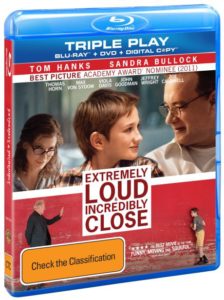 Warner has sent over a Q & A and an exclusive video about young actor Thomas Horn, star of the Oscar-nominated Extremely Loud & Incredibly Close, out on DVD and Blu-Ray this week in Australia from Warner.
Warner has sent over a Q & A and an exclusive video about young actor Thomas Horn, star of the Oscar-nominated Extremely Loud & Incredibly Close, out on DVD and Blu-Ray this week in Australia from Warner.
Adapted from the acclaimed bestseller by Jonathan Safran Foer, Extremely Loud & Incredibly Close is a story that unfolds from inside the young mind of Oskar Schell, an inventive eleven year-old New Yorker whose discovery of a key in his deceased father’s belongings sets him off on an urgent search across the city for the lock it will open. A year after his father died in the World Trade Center on what Oskar calls “The Worst Day,” he is determined to keep his vital connection to the man who playfully cajoled him into confronting his wildest fears. Now, as Oskar crosses the five New York boroughs in quest of the missing lock – encountering an eclectic assortment of people who are each survivors in their own way – he begins to uncover unseen links to the father he misses, to the mother who seems so far away from him and to the whole noisy, dangerous, discombobulating world around him.
Extremely Loud & Incredibly Close is released on DVD and Blu-ray on 27 June 2012 in Australia from Warner.
[jwplayer config=”Custom Player” mediaid=”65520″]
QUESTION: You wouldn’t remember the events of 9/11, per se, so how did you come up with the feelings of fear that you needed? Was it by researching news, simply from the script, something the director gave you?
THOMAS HORN: I used a combination of methods to achieve Oskar‘s fear. Before I had an especially fearful scene like one of those when I’m among the city and seeing things where I’m very afraid of them, I had to occasionally go to a quiet place and think about how the character would react to these things, and, sometimes, that was very hard. It could take five or ten or fifteen minutes thinking about how Oskar would feel in this quiet place. We’re such different people, but after a while, when I stopped thinking about myself and was in Oscar‘s shoes and could really feel what he was afraid of, then I could go out and do my best job.
QUESTION: Coming into the world of filmmaking as a complete newcomer, how did your family and friends, your non-Hollywood family and friends, help support you and encourage you?
THOMAS HORN: Well, they were really supportive and wonderful. My parents especially, really let me go to have a nice experience without holding me back too much or without pushing me forward too much. They were very supportive, wonderful with that, and I’m really grateful. I have a younger brother and he was also really cool about it which is great. My friends at home were all really supportive, too. They thought it was really wonderful and very interesting that I got this opportunity.
QUESTION: Even something as simple as learning all those lines, because you had a lot of dialog, you had a lot to do, the burden was on you. Any tricks for memorizing lines? What was your technique?
THOMAS HORN: Well, I just looked over them before bed every night. They were very good at giving the lines to me the day before which I’m really grateful for. I tried to take some time before bed to memorize them and then sleep on them and review them in the morning, go out and do what I could.
QUESTION: Now, do you suppose a career as a film actor is your professional goal for always, or is there something else you want to do?
THOMAS HORN: Well, I think one thing that I really aspire to is to have a career in multiple fields at once because, I mean, it seems best not to put your life in one basket, to force yourself to do one thing, and I think acting, film or theater, TV, whatever it is could possibly be one of the fields I choose to operate in, but I think also something in business, something in computers, maybe and also philanthropy are some things that I want to do some time during my life. I may continue with acting. I would be very happy to do it if I find another story that speaks to me. If I find an opportunity to work with people who I really like to work with and the script speaks to me. Those two things at once are critical, and, if I can find something like that, I might want to go for it again.
QUESTION: Now, when you say, if the script speaks to me, whose opinion do you first go to? Do you go to Mom, Dad, your agent? Who’s your trust touchstone?
THOMAS HORN: Well, I go to all those people, especially my family, because they’re very important to me, and I’m really close to them, of course. I can’t like it unless it speaks to me personally, unless I really feel a certain emotion or feel that this script is a good story.





It kind of makes me tear up when I think about the end of
this movie, which is really the climax that makes some of the slower exposition
of the movie completely worth the time. Sandra
Bullock delivered her best but unfortunately short performance of her life
too. I’m very grateful I saw the movie
on the Blockbuster @Home website and ordered the Blu-ray because it really
enriched my life. I prefer an unlimited
service like Blockbuster @Home and my son even gets the games by-mail that are
included besides Blu-ray, which helps save money over buying them constantly.